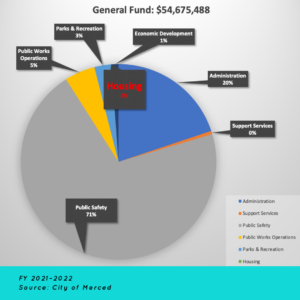
A breakdown of where the City of Merced’s general fund goes. (Leadership Counsel for Justice and Accountability)
The City of Merced’s current budget is around $483 million dollars. This includes both non-discretionary and discretionary funds. Non-discretionary means that these funds are earmarked for specific uses and must only be used for those purposes, such as funding for public infrastructure. Discretionary funds have flexibility in that the City Council can determine how much and where these funds are allocated. This makes up the General Fund, which has an operating amount of $54 million dollars.
Although Merced receives some state and federal funding for affordable housing (that must be used for affordable housing development and/or infrastructure), Merced City Council does not allocate any of its General Fund dollars to support affordable housing. In other words, Merced invests 0% of all locally generated funding towards affordable housing, e.g. taxes, charges for services, permits, licenses, penalties, fines, etc.
The last affordable housing project completed was in 2014, known as Woodbridge Place (behind/near Walmart). The most current affordable housing development on Childs and B Street will be completed sometime this year. That is an eight year gap that no affordable housing was made available to very low and low income households.
Merced continues to receive annual allocations from state and/or federal funds for affordable housing, however, that is nowhere near enough to meet its growing affordable housing need. It would be prudent for the City Council to strategize alternative and additional financial approaches that would generate local funding for affordable housing to supplement state and federal housing funds.
At the budget town hall meeting last Thursday, Mayor Serratto stated, “Obviously, anybody who pays attention to the City Council meetings would know that our 2021 was dominated extensively by discussions on housing. We spent a lot of time talking about housing, housing policy, housing funding.” Yet, the Council has never discussed what the City itself would contribute to affordable housing.
One of the demands that affordable housing advocates are asking for at the budget town hall meetings is an affordable housing trust fund with a general fund allocation of $20 million dollars that would help develop affordable housing and programs to support marginalized groups, such as farmworkers, transitional youth (ages 18-24) and low income families.
The state has a Local Housing Trust Fund Program that provides matching funds (dollar for dollar) if Merced allocated local funding to its own housing trust fund. However, the City has rejected this idea and, instead, is relying on the county to create a regional housing trust fund, and, without a sustainable local revenue source or a clear timeline, this seems unlikely to happen anytime soon, if at all.
The City needs more affordable housing now. Merced City Council must initiate its own local housing trust fund this year to begin contributing its own money towards the creation of affordable housing in Merced.
As Natalia Stewart, a young person, said at the meeting regarding the City’s lack of affordable housing, “It’s a problem that brings more problems with it. It affects people in my community mentally and emotionally because they don’t have the support they need to have a human right [to] housing.” Merced residents are clearly denied affordable housing when their own local government refuses to allocate any of the City’s local revenue towards affordable housing.
This needs to change. Join us this Thursday (Feb. 17) at the last budget town hall meeting at 6pm (678 W. 18th St., 2nd floor) and tell Merced City Council to fund affordable housing.
 Translate
Translate
